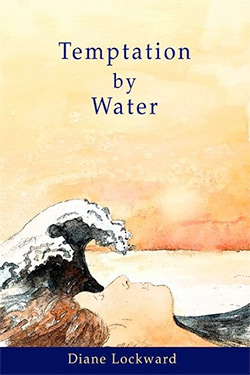Temptation by Water
by Diane Lockward
reviewed by Marjorie Tesser
Temptation by Water is the third full-length collection of poetry by Diane Lockward, poet laureate of West Caldwell, New Jersey. In it, she continues explorations begun in Eve’s Red Dress (2003) and What Feeds Us (2006), and delivers closely observed, personal poems of everyday life, love, domesticity, and the sensual world.
The theme of this book, set out in the epigraph and title poem, is temptation. In the first poems, desire has led to disaster. In “Imploded,” the heart is compared to a destroyed building, “Just the soft mushroom of dust and ash, / the quiet collapse inside.” Soon, the sources of hurt and disappointment become apparent: a lover who proved more flash than substance, a beloved child whose addictions have caused pain, a parent who is aging.
Lockward is expert at reflecting complexity of emotion; her wry, battle-scarred humor refuses to be vanquished, and some of the angriest poems in the collection are also the funniest. In “Leaving in Pieces,” a woman whose husband has disappointed her replaces him with a dog. “It Runs This Deep” begins by quoting a bumper sticker, “Jesus loves you. / Everyone else thinks you’re an asshole,” and continues, “But not your mother,” recounting the love she’s lavished on someone who didn’t deserve it in the eyes of the world. The poem conveys a realistic mix of frustration, fury, sarcasm, and stubborn tenderness.
“Why I Won’t Get a Massage,” a chronicle of the narrator’s aging body, renders the loss of youth and love poignantly but again, with humor. In this and other poems, the author’s mature perspective evinces a grudging sympathy for the less-than-perfect. “Filbert” celebrates “a runt of a nut,” “If Only Humpty Dumpty Had Been a Cookie,” a list poem, begins by waxing enthusiastic about delectable treats, but soon shifts into another mode, noting
an odd cookie, one that doesn’t belong,
like a bitter espresso wafer, wimpy jelly tabby,
granola jumble with texture but not taste,
cookies that went astray.
The poems in Temptation by Water, lucid, image-filled, and largely free verse, provide much pleasure. Lockward strikes a balance between schoolteacher-like precision and gut honesty, and although she does not shy from poems about the less sanitized aspects of a woman’s experience, a characteristic she shares with her oft-cited influences, Sharon Olds and Lucille Clifton, her poems are not shocking or sexually graphic. More journalist than philosopher or activist, Lockward concerns herself with what is, rather than why it is or should not be.
In the final poem, “Seventh Grade Science Project,” a child distracts herself from her parent’s ruined marriage by focusing on collecting butterflies. The beauty of the meadow and butterflies are offset by the clinical detachment the child displays in dispatching her subjects. But the ability to experience pain and transcend it has left the speaker stronger.
The pin-pricked fingers, wasp
stings, and blood on my arms
were what I paid for my first
A in science. All that summer
I ran like something wild and left
my multi-colored fingerprints
on everything I touched.
The speaker in the poems comes to terms with losses and transcends them by focusing not on the heart or the mind, but on the redemptive joys of the sensual world. She finds a return to happiness in the delights of a juicy peach, a budding garden, bright yellow birds, a hot red dress, and ultimately, a new love. “Love Song With a Plum” exemplifies not only Lockward’s joy in description and sense of play in language, but also her attitude towards her subject.
But today, the air is scented with plumeria,
and at this particular fruit stand, I’m plumb
loco in love with the plumiest
man. Festooned with peacock plumes
and swaddled in the plumage
of my happiness, I want to stand at the perimeter
of this plum-luscious
earth, sink a plumb
line for balance, then plummet
like a bird on fire, placate
all my desires, my implacable
hunger for the ripeness of my sweetheart’s plum.
Unlike John Donne, whom she names as a major influence, Lockward does not feel conflicted by temptation. Although it has led her to love that ended in sorrow, still she courts it, reveling in the spectrum of sensory delights. Having faced pain squarely, she is able to focus on joy.
Published on March 18, 2013

